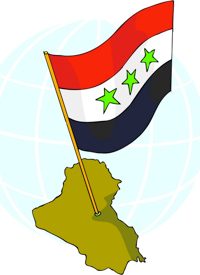
"Just as Iraq has pledged not to interfere in other nations, other nations must not interfere in Iraq," Obama said after meeting Iraqi Prime Minister Nuri al-Maliki at the White House. The statement is seen as a warning to Iran not to interfere in the affairs of its neighbor. Iran and Iraq warred against one another in the 1980s when Iraq was under the rule of Saddam Hussein, but forged new ties since Maliki's government has been in power in Baghdad. The United States, fearing Iran may develop nuclear weapons, is using sanctions and other means to pressure the Tehran government to abandon its nuclear program and is hoping neighboring Iraq will retain its close ties to the United States. The United States has the world's largest embassy in Iraq and will retain some 16,000 employees there. But the Baghdad government is expected to exercise its independence in relations with Iran as well as other countries in the region.
"I think that obviously the US troop withdrawal will mean that there's less influence, less US influence," Ali al-Saffar, an Iraq analyst with the Economist Intelligence Unit in London, told the French international news service Agence France-Presse (AFP). But the economic interests of both countries will support continued trade and diplomatic relations between the United States and Iraq, "The Iraqis understand that they need to have US companies in Iraq and that there's going to probably be quite an important trade relationship between the two countries well into the future," Saffar said. The ties revolve around oil and arms. Iraq is expected to dramatically increase its production of crude oil and continue to continue making substantial purchases of weapons from the United States. In addition, the United States will retain 157 U.S. military personnel and up to 763 civilian contractors at its Baghdad embassy after the completion of the withdrawal of American combat troops, to train Iraqi forces on the use of American military equipment purchased by the Iraq government.
Maliki met with Obama at the White House Monday to mark the end of the American military presence in Iraq. The troop withdrawal is to be completed on December 31, in accordance with the Status of Forces agreement negotiated between the George W. Bush administration and the Maliki government in 2008. The Obama administration had sought an extension of the agreement, but Baghdad declined, refusing to accept the U.S. condition of immunity of U.S. military personnel from prosecution by Iraq for crimes they might commit in that country.
The American President and Iraqi Prime Minister visited Arlington National Cemetery and placed a wreath on the tomb of the unknown soldier. They did not visit the part of the cemetery containing the graves of Americans killed in Iraq. More than 4,000 Americans died in the nearly nine years of conflict that began with the March 19 invasion that led to the swift overthrow and eventual capture of Iraqi dictator Saddam Hussein. While thanking the United States for its commitments to Iraq and its new government, al-Maliki declined to join Obama in calling for President Bashad Assad to step down in Iraq's neighbor, Syria, where clashes between government and dissident forces have brought the country to the brink of civil war. The Iraqi leader said he could not ask the President of another country to abdicate. President Obama professed to be untroubled by that decision.
"Even if there are tactical disagreements between Iraq and the United States at this point on how to deal with Syria, I have absolutely no doubt that these decisions are being made based on what Prime Minister Maliki believes is best for Iraq … not based on considerations of what Iran would like to see," Obama said.



